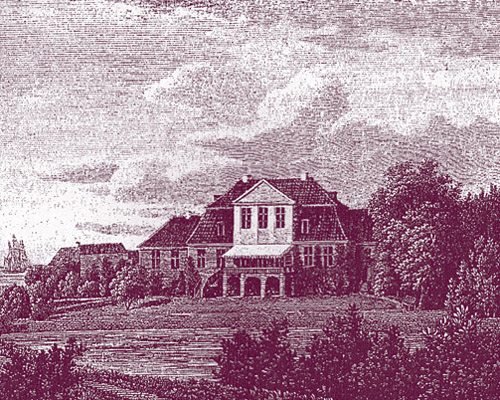| Romantik og patriotisme

| | Den tidlige romantik i slutningen af 1700-tallet tager udgangspunkt i naturfølsomhed og patriotisme.
Geværfabrikanten Ernst Schimmelmann samlede en kreds af tidens åndspersoner omkring sig, bl.a. ved sammenkomster og besøg på Hellebækgård i Nordsjælland om sommeren. |
Henimod slutningen af 1700-tallet udvikledes Hellebæk sig til et centrum for en ny tids åndelige strømninger, romantikken. Den tidlige romantik tog udgangspunkt i naturfølsomhed og patriotisme, en fædrelandskærlighed der dog ikke skelnede imellem dansk, tysk eller norsk indenfor den enevældige, danske helstats grænser.
Hyldest til Hellebæk
Naturen omkring Hellebæk appellerede åbenlyst til den tidlige romantiske ånd i anden halvdel af 1700-tallet og den unge Ernst Schimmelmann, som omkring 1768 overtog ledelsen af geværfabrikken i Hellebæk på sin faders vegne, var levende interesseret i tidens naturfølsomme tankegang. Efter det første besøg på lokaliteten beskriver han i et brev til sin ven juristen August Hennings omgivelserne således:
"Jeg kommer i dag tilbage fra Helsingøer hvor jeg har tilbragt to Dage for at besee Geværfabriken, som ligger en halv Mils Vej paa den anden Side af denne By.
De kan ikke tænke Dem noget mere henrivende Sted. De forskjelligste, de meest romantiske Naturscener ere der forenede. Det ligger ved Bredden af Havet. der uophørligt er bedækket med Skibe; lige overfor ser man Sverigs Klipper. Søger De en ensom eller rolig Plet, behøver De blot at gaa ind i Skoven. som gjemmer en Rigdom af Søer; er De træt af disse, ville forskjeliige Bække oplive Dem med deres Rislen. Høie med bliide Skraaninger, dunkle og stille Dale - dog, min Kjære, jeg veed ikke, hvorledes jeg bærer mig ad; men jeg beskriver meget kummerligt det skiønneste Sted i Verden. See bort fra min Beskrivelse, og forestil Dem et fuldkomment henrivende Landskab: fortryllende om Sommeren og højtidsfuldt om Vinteren.
Alt dette er kun en Forberedelse; men mit projektrige Hoved har undfanget en Ide, nemlig den, at vi - hvis De kommer Elskværdigste - meget godt kunne sige Verden farvel for en Maaned eller længere og kaste os i Armene paa denne tiltrækkende Ensomhed…"
Friedrich Leopold, greve af Stolberg, skrev i 1776 et digt til "Hellebeck. Eine Seeländische Gegend". Friedrich Stolbergs far var overhofmester hos enkedronning Sofie Amalie på Hørsholm gods, hvor han medvirkede til at iværksætte de tidligste landboreformer omkring 1750.
Sønnen Friedrich studerede i Göttingen, hvor han kom i nærmere berøring med Klopstocks romantik. Sine tidlige år tilbragte han imidlertid i Danmark og det er Øresund han besynger i sine hymner til havet. Naturen er i centrum for hans lyrik, den betragtes som hellig og mennesket er i pagt med naturen. Det er universalromantik i tidlig klædning.

Ernst Schimmelmann 1747-1831 |
Samlingspunkt
Ernst Schimmelmann samlede en kreds af tidens åndspersoner omkring sig, bl.a. ved sammenkomster og besøg på Hellebækgård om sommeren. Blandt gæsterne var de romantiske digtere Friedrich Klopstock, Friedrich Stolberg, Jens Baggesen og Adam Oehlenschläger, filosoffen Heinrich Steffens og naturvidenskabsmanden H.C.Ørsted.
I denne tidlige fase af romantikken, førend nationalromantik og nationalfølelse for alvor sætter sig igennem, skelnede man indenfor helstaten ikke imellem tysk og dansk, eller for den sags skyld norsk, og betegnende herfor udkommer Jens Baggesens ode til Ernst Schimmelmann med titlen "Hellebecks Harpe" i tysk redaktion i 1801.

Jens Baggesen 1764 - 1826 | 
A. Oehlenschläger 1779-1850 | 
H.C. Ørsted 1777-1851 |
Folk og Fædreland
Romantikkens gennembrud i Danmark regnes ofte med Adam Oehlensclägers Digte 1803, som han skriver under påvirkning af filosoffen Heinrich Steffens, født i Norge, opvokset i Danmark og uddannet i Tyskland. Oehlenschläger blev skarp forfulgt af dansk-tyskeren Schack Staffelt født på Rügen, der udsendte Digte 1804, men allerede i 1793 havde leveret en romantisk hilsen til Øresund
Den intense naturdyrkelse er et karakteristisk træk ved den tidlige romantik, patriotismen et andet. Patriotisme betyder fædrelandskærlighed, men i første omgang ikke i nationalromantikkens snævre forstand, hvor en nation forbindes med begrebet folk i betydningen en gruppe mennesker, som har samme sprog, kultur og historie. Denne opfattelse tager form i tiden omkring den franske revolution, men endnu er mange af Europas lande, ligesom Danmark-Norge, multinationale samfund, der statsligt er knyttet sammen af en fælles fyrstemagt.
Ikke desto mindre var den nationale fællesskabsfølelse i anmarch og man begyndte også at få øje på folket. Dette havde også rod i oplysningstidens interesse for særegne befolkningsgrupper og deres levevis og gerninger. Denne interesse viser sig allerede i forbindelse med kong Christian d.6.s rejse til Norge i 1733 og siden hen med etableringen af Normandsdalen i Fredensborg Slotspark, hvor der blev opstillet en lang række statuer af mere eksotiske repræsentanter for kongeriget.

Heinrich Steffens |
Johannes Ewald
I den danske helstat havde man indtil videre hovedsagelig blik for heroiske og opofrende gerninger i fortid og nutid som kunne styrke og gavne samfundet og fællesskabsfølelsen. Et godt eksempel på en sådan begivenhed er en stranding på Nordsjælland kyst, nærmere betegnet Hornbæk, hvor lokale fiskere d. 9.11.1774 på heltemodig vis kastede sig ud i en redningsaktion.
Poeten Johannes Ewald bliver opfordret til at skildre begivenheden og skriver syngespillet "Fiskerne" som opføres i 1779. Herfra stammer nationalsangen, den såkaldte kongesang, "Kong Kristian". Tidligere konger og søheltes store patriotiske gerninger besynges og forbindes i skuespillet med den jævne mands opofrende og heltemodige optræden og hermed knyttes båndene imellem folk og regent.
Allerede i 1776 havde Ewald haft stor succes med en Ode til Indfødsretten. Loven om Indfødsretten bestemte at embeder i administrationen var forbeholdt personer der var født i helstaten. Dette skulle med andre ord styrke helstatspatriotismen og kom som en reaktion på den massive tyske indflydelse i Struenses regeringstid (1770-73). Johannes Ewald var i øvrigt var tæt knyttet til det nordsjællandske, han besang Rungsteds Lyksaligheder og hans Ode til Sjælen er forfattet i hans tid i Espergærde-Humlebæk.

Johannes Ewald 1743-1781 | 
Kongesangen |
|